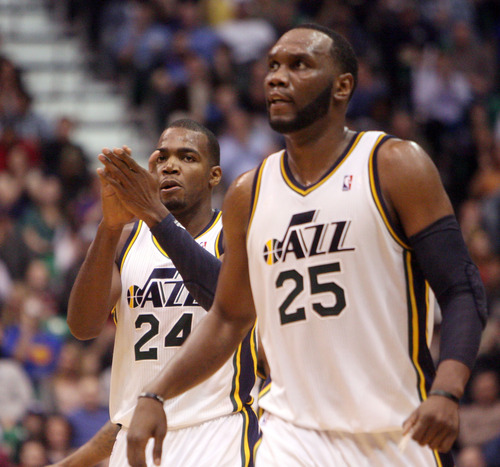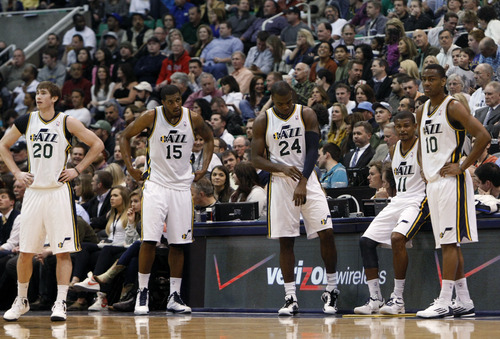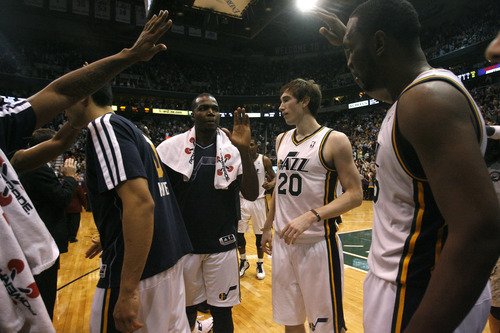This is an archived article that was published on sltrib.com in 2013, and information in the article may be outdated. It is provided only for personal research purposes and may not be reprinted.
Jazz scouts and the executives they report to huddled late into a dark, snowy Wednesday night, evaluating every possible option. And while general manager Dennis Lindsey allowed himself time for breakfast with his family Thursday morning, he kept his cellphone within reach.
But when the NBA's trade deadline passed at 1 p.m. MT, the Jazz emerged the same team as when they began the season. Presented with options to trade Al Jefferson or Paul Millsap, franchise cornerstones with appealing expiring contracts, Lindsey said the team decided to "bet on ourselves" in the offseason and not make a trade.
"I think Kevin [O'Connor] and I made 30 good deals," Lindsey said. "We just said, 'No.' "
For months, the Jazz were considered likely to be among the most active teams at the deadline. Both Millsap and Jefferson had value around the league, and had been linked to deals involving contenders such as San Antonio and the Los Angeles Clippers.
When the Jazz weighed all of the factors of potential trades, Lindsey said, "We didn't really even have that many tough decisions."
Lindsey said the Jazz were looking to add pieces that would serve them well for both a playoff push and as part of their long-term future, with a young core that includes Gordon Hayward, Derrick Favors, Enes Kanter and Alec Burks.
"We were very strong in pursuing that," Lindsey said, "but when we added it up, there wasn't anything that was better than what we had."
The Jazz are 31-24, and half a game out of sixth place in the competitive Western Conference. They have won 14 of their last 20 games, although Lindsey said recent successes had little to do with the Jazz holding off from activity.
If there was a surprise to the Jazz's approach to the deadline, it was that they held on to the expiring contract of estranged guard Raja Bell. Bell, 36, is in the final year of a three-year contract, but has not been with the team all season after getting in hot water for pointed comments directed at coach Tyrone Corbin. Asked whether the Jazz tried to trade Bell, or if they intended to negotiate a buyout, Lindsey declined to comment, saying, "Out of respect to Raja and Herb Rudoy, his agent, we've agreed not to make any public statements and we're going to stay true to that."
At the conclusion of what could have been, and maybe was, the biggest day of his first season as the Jazz GM, Lindsey gave a candid evaluation of his team.
"We're playoff-competitive," he said. "We want to be championship-caliber. We're short of that."
Armed with eight expiring contracts, the Jazz believed they operated from a position of power. With a new, punitive luxury tax kicking in for the 2013-14 season, financial flexibility will be paramount. The Jazz can take confidence in the fact they will have upward of $40 million in cap space.
"We decided the incumbent position was the strongest now and going forward," Lindsey said. "We'll see. We'll see if we're right or wrong."
Most of the league took a conservative approach to the trade deadline. The highest-profile player traded was J.J. Redick, sent from Orlando to Milwaukee.
Lindsey acknowledged it was a calculated risk allowing both Jefferson and Millsap — players he said have had All-Star-caliber seasons — to enter the summer as free agents. Lindsey called the decision a "value proposition" and said that when the team considered the options presented in trades "weren't enough to give up on players that are good players and that are good people."
It's a near certainty that the Jazz will not bring back both Millsap and Jefferson next season, and while it's possible both could sign elsewhere as free agents, by keeping them through the season the Jazz gave themselves a chance to retain either player.
Twitter: @tribjazz —
Deadline dud
• At deadline, Jazz say no and don't "really even have that many tough decisions."
• The Jazz will take eight expiring contracts into the offseason.
• It was a quiet deadline day around the league, with J.J. Redick the biggest name dealt.







